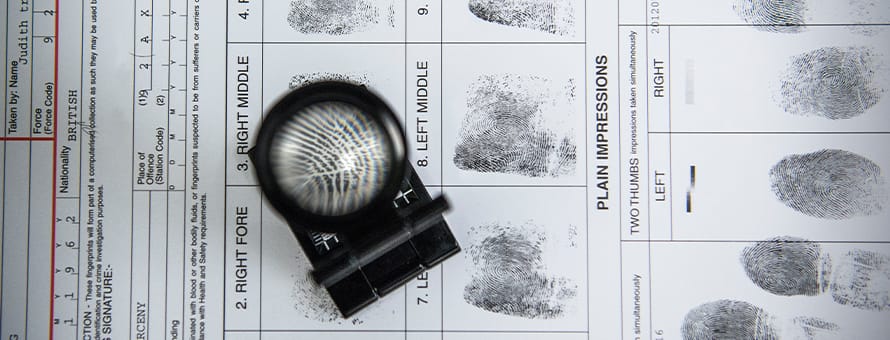5 Jobs in Law Enforcement That Are Not Police Officers

You want to use your career to make a difference and keep communities safe, but you’re not looking to become a police officer. So, what are your options?
Good news: There are lots of roles for someone like you. Law enforcement is a large and diverse field with a wide array of opportunities outside of police work. And no matter what career path you choose, you can feel confident in the value of your contributions. Chris Utecht, a former Wisconsin police chief and current adjunct faculty member at Southern New Hampshire University (SNHU), underscored the importance of law enforcement professionals — regardless of their title.
“These roles are essential for the smooth functioning of law enforcement agencies and contribute significantly to public safety,” he said.
Can You Work in Law Enforcement Without Being a Cop?
Absolutely. Whether you're brand new to the field or retiring from your career as a police officer, there are a number of roles within law enforcement you might consider.
Dispatcher
As a dispatcher or 911 operator, your job is to provide immediate support to individuals in emergency situations, making you a critical piece of the law enforcement puzzle. According to the U.S. Bureau of Labor Statistics (BLS), dispatchers work in call centers called public safety answering points (PSAPs), and their schedules can include weekends, nights and even holidays due to the critical nature of the work they do.

The BLS also noted that most dispatcher positions don’t require a bachelor’s degree — only a high school diploma or GED — making it an accessible entry point into the field. For many, Utecht noted, working as a dispatcher can be a great way to get your foot in the law enforcement door.
“These roles are critical, serving as the first point of contact for emergencies and requiring the ability to remain calm under pressure, gather essential information and dispatch appropriate resources,” he said. “This position offers insight into the operational aspects of law enforcement and emergency response.”
Administrative Staff

Every effective police station needs a strong foundation to keep things running smoothly. That’s where administrative staff come in.
Susan Wind, an adjunct faculty member at SNHU, has held numerous law enforcement positions throughout her career, with the Department of Juvenile Justice, Probation and Parole and numerous police departments. Despite her breadth of experience, she was quick to highlight the value of administrative staff roles.
“These ‘behind the scenes’ positions are the backbone to the agency,” she said.
According to Utecht, administrative staff manage essential records, logistics and communication, keeping things organized and efficient. These positions are another entry point for newcomers to the field as, like dispatcher roles, they typically only require candidates to have a high school diploma.
For SNHU graduate Emily Bevens ’23G, a job as a records clerk at her local police department was where her law enforcement career began. She said that while not required for the role, she felt her bachelor's degree gave her a leg up.
“I felt that it set me apart from others, and that it would be beneficial to have on my resume as I progressed in my career,” she said.
And that degree — plus the experience she gained as a records clerk — has, in fact, been beneficial for Bevens. Where is she now?
Crime Analyst

Bevens went on to earn her master's in psychology with a concentration in forensic psychology, and now works as an investigative analyst, or crime analyst.
“I collect, analyze and disseminate information relating to criminal activity within our jurisdiction using a variety of analytical tools and databases,” she said. “I also provide case support to detectives, and add relevant information to cases each day after going through incidents that occurred in the days prior.”
Wind, who spent a portion of her career working as a crime analyst herself, said it was one of her favorite roles.
“These individuals are usually the reason why detectives get the leads they do,” she said. “Without them, law enforcement could not be as effective in doing their jobs.”
To be a crime analyst, you’ll typically need a bachelor’s degree, according to The Center for Naval Analyses — and for good reason. Bevens said that her work as a records clerk plus the knowledge and skills she gained in her degree program set her up for success in this role.
“My job in the records department was a great starting point,” she said. “My degree provided me with the necessary background information on the judicial system, and how procedures within our courts and law enforcement work.”
Forensic Analyst
![]() If you’re science-minded with an eye for detail, you might consider a role as a forensic analyst. According to Utecht, forensic analysts, also known as evidence technicians, are charged with analyzing various types of physical evidence collected from crime scenes. From DNA analysis and fingerprint identification, to ballistics and toxicology, these scientists use attention to detail to provide critical information for investigations and court proceedings.
If you’re science-minded with an eye for detail, you might consider a role as a forensic analyst. According to Utecht, forensic analysts, also known as evidence technicians, are charged with analyzing various types of physical evidence collected from crime scenes. From DNA analysis and fingerprint identification, to ballistics and toxicology, these scientists use attention to detail to provide critical information for investigations and court proceedings.
The BLS noted that forensic analyst roles typically require a bachelor’s degree. Utecht added that this role can involve some unique skills, too — like photography and sketching — and can appeal to someone who enjoys creative work, too.
Government Positions
![]() Maybe you’re looking to go beyond your local community and make an impact at the federal level. With a bachelor’s degree in hand, you have the option of exploring roles in various government organizations: The FBI, DEA, Secret Service, Border Patrol and Customs, and more. Utecht noted that the appeal here, for many, is each department’s unique mission and focus.
Maybe you’re looking to go beyond your local community and make an impact at the federal level. With a bachelor’s degree in hand, you have the option of exploring roles in various government organizations: The FBI, DEA, Secret Service, Border Patrol and Customs, and more. Utecht noted that the appeal here, for many, is each department’s unique mission and focus.
“These agencies often attract individuals interested in national security,” he said.
Keep in mind that the qualifications for government positions differ based on the agency and job type.
To be a special agent for the FBI, for example, you need to have some relevant professional experience in addition to a bachelor’s degree. To be considered for a special agent position in the U.S. Drug Enforcement Administration (DEA), candidates need a bachelor’s, too. There are also physical fitness, age and background check requirements for specialized government roles like these.
Find Your Program
Skills You’ll Need — No Matter Your Path
When it comes to pursuing any role in the law enforcement field, Utecht said there are a number of skills that can help set candidates up for success. Strong communication skills are essential, as many law enforcement positions need people who are quick, calm and clear.
![]() “Accurate and detailed writing is crucial,” he said. “Those interested in a career in law enforcement should take every opportunity to hone their writing skills.”
“Accurate and detailed writing is crucial,” he said. “Those interested in a career in law enforcement should take every opportunity to hone their writing skills.”
Utecht also noted that people skills like empathy and conflict-resolution are equally valuable, as many roles are public-facing. He also emphasized that resilience and grit are instrumental in navigating high-stress, high-stakes situations, and that someone considering a career in the field needs to be prepared for the challenges that come with it.
“While these roles may not involve direct confrontation or the immediate adrenaline of frontline policing, they often come with their own set of stressors,” Utecht said. “The weight of responsibility for accuracy and efficiency is significant.”
He also noted that while at times stressful and demanding, a career in this field can also be rich in a sense of meaning and fulfillment. If you’re motivated by the heart of what law enforcement aims to do — keep people safe — Utecht said the challenges are worth it.
“If you’re driven by a desire to make a positive difference and possess a strong sense of ethics, a career in law enforcement can be a deeply rewarding choice,” he said.

What is the Best Criminal Justice Job?
Within law enforcement, there are many paths you might choose to take — and the right one for you really depends on your goals. But ultimately, Utecht said, it's smart to pursue a role that feels most closely aligned with your interests and skills.
“The field is vast,” he said. “It encompasses roles that require different aptitudes and temperaments.”
How to Start Your Career in Law Enforcement
If you're looking to break into the field, Utecht recommends gaining as much practical experience as possible prior to landing on your path of choice — through internships, volunteering or entry-level positions, like being dispatcher or working in an administrative role. Once you have an understanding of where you’re headed, you’ll want to invest in your education and any specialized training required for the role you’re interested in. And Utecht’s last piece of advice?
“Be realistic about the challenges and rewards of a career in law enforcement,” he said. “It can be demanding and, at times, emotionally taxing. But it can also contribute to the greater good.”
Abigail (Abby) Syversen-Mark ’23G is a copywriter, contributing content writer and adjunct faculty member at Southern New Hampshire University (SNHU). A passionate storyteller, Abby hopes her writing will help prospective students and employees alike see just how transformative SNHU could be for them (as it’s been pretty transformative for her). You can connect with her on LinkedIn.
Explore more content like this article

How Military Veteran Angel Delatorre Found Psychology

What Can I Do With a Criminal Justice Degree?

How Psychology Grad Amanda Saldana Found Community as an Online Student
About Southern New Hampshire University

SNHU is a nonprofit, accredited university with a mission to make high-quality education more accessible and affordable for everyone.
Founded in 1932, and online since 1995, we’ve helped countless students reach their goals with flexible, career-focused programs. Our 300-acre campus in Manchester, NH is home to over 3,000 students, and we serve over 135,000 students online. Visit our about SNHU page to learn more about our mission, accreditations, leadership team, national recognitions and awards.


